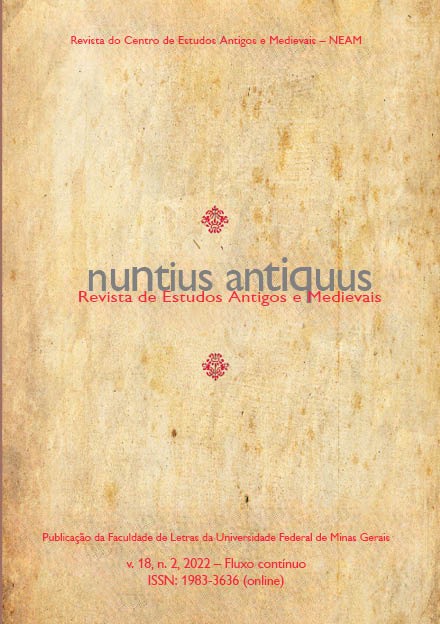The first Lysistrata’s Brazilian translations
context and reception
Keywords:
Lysistrata, Classical Reception, History of TranslationAbstract
The first translations of Aristophanes’ Lysistrata in Brazil date only from the sixties of the last century. In 1964, Mário da Gama Kury (Rio de Janeiro: Civilização Brasileira, 1964) publishes the play entitled A Greve do Sexo, in volume that included A Revolução das Mulheres (Ecclesiazusae); in 1967, Millôr Fernandes translated it at the request of actress Ruth Escobar, who staged it in the same year in a production with great repercussions in São Paulo – the translation, however, would only be published ten years later (1977). These translations had great commercial success and are still read and published today, although the comedy has received new versions since then. Understanding that they are products of their time and represent forms of reception of the ancient legacy, I intend to investigate how the Brazilian historical-cultural context determined a) the choice of this comedy, previously neglected by publishers and absent from the stages; b) the options adopted by the translators to translate the work. At the same time, I will point out how they determined the reception of comedy in Brazil, which goes beyond the literary scope, contributing to turn the character into a symbol of political resistance and feminist activism under the military dictatorship.
Downloads
References
ALMEIDA PRADO, D. Lisístrata, no Teatro Galpão. O Estado de São Paulo, São Paulo, 21 jan., 1968. Geral, p. 19. Disponível em: <http://acervo.estadao.com.br/pagina/#!/19680121-28460-nac-0019-999-19-not>. Acesso em: 18 out. 2022.
ALVES, Márcio Moreira. Ato Institucional 5 – Íntegra do discurso do ex-deputado Márcio Moreira Alves (02’ 51”). In: RÁDIO Câmara. Brasília: Câmara dos Deputados, 2006. Áudio. Disponível em: <https://www.camara.leg.br/radio/programas/273666-ato-institucional-5-integra-do-discurso-do-ex-deputado-marcio-moreira-alves-02-51/>. Acesso em: 11 dez. 2022.
ARISTÓFANES. A Greve do Sexo (Lisístrata); e, A Revolução das Mulheres. Tradução e adaptação de Mário da Gama Kury. Rio de Janeiro: Civilização Brasileira, 1964.
ARISTÓFANES. Lisístrata; e, As nuvens. Respectivas traduções de Millôr Fernandes e Gilda Maria Reale Starzynski. São Paulo: Abril Cultural, 1977.
ARISTOPHANES. Lysistrata. Edited with introduction and commentary by Jeffrey Henderson. Oxford: Clarendon Press, 1990.
CAMPANHA da Mulher pela Democraria (Camde). Rio de Janeiro: CPDOC FGV, [c2009]. Disponível em: <http://www.fgv.br/cpdoc/acervo/dicionarios/verbete-tematico/campanha-da-mulher-pela-democracia-camde>. Acesso em: 17 out. 2022.
DISCURSO Marcio Moreira Alves AI-5. [S.l.]:[s.n.], 2008. Publicado no canal Danilo Reis. Disponível em: <https://www.youtube.com/watch?v=F2Gs_ZrU-bY>. Acesso em: 11 dez. 2022.
DUARTE, A. Operação Lisístrata: do teatro ao Ato. A recepção da comédia de Aristófanes durante os anos de chumbo da ditadura brasileira. Phaos: Revista de Estudos Clássicos, Campinas, v. 15, p. 65-79, 2015.
FERNANDES, M. Texto de apresentação no Programa de Lisístrata, 1968.
GONÇALVES JUNIOR, V. 1964: Pouco antes do golpe, reforma agrária esteve no centro dos debates no Senado. Senado Notícia, 25 mar. 2014. Disponível em: <https://www12.senado.leg.br/noticias/materias/2014/03/24/1964-pouco-antes-do-golpe-reforma-agraria-esteve-no-centro-dos-debates-no-senado>. Acesso em: 17 out. 2022.
LISÍSTRATA. In: ENCICLOPÉDIA Itaú Cultural de Arte e Cultura Brasileira. São Paulo: Itaú Cultural, [2001–2003]. Disponível em: <http://enciclopedia.itaucultural.org.br/evento403577/lisistrata>. Acesso em: 18 out. 2022.
MACHADO, A. Metade é verdade: Ruth Escobar. São Paulo: Edições Sesc São Paulo, 2020.
QUARTIM DE MORAES, A. P. Anos de chumbo: o teatro brasileiro na cena de 1968. São Paulo: Edições Sesc São Paulo, 2018.
PITTS, B. “O sangue da mocidade está correndo”: a classe política e seus filhos enfrentam os militares em 1968. Revista Brasileira de História, São Paulo, v. 34, n. 67, p. 39-65, 2014. Disponível em: <http://www.scielo.br/scielo.php?script=sci_arttext&pid=S0102-01882014000100003>. Acesso em: 11 dez. 2022.
TUFFANI, E. Repertório brasileiro de língua e literatura latina (1830-1996). Cotia: Íbis, 1996.
TUFFANI, E. Repertório brasileiro de língua e literatura latina (1830-1996). Apresentação de Zélia de Almeida Cardoso. Reprodução acompanhada de um artigo com correções para o panorama histórico. Rio de Janeiro: [s. n.], [2006–2018]. Disponível em: <https://www.academia.edu/39327783/REPERT%C3%93RIO_BRASILEIRO_DE_L%C3%8DNGUA_E_LITERATURA_LATINA_1830_1996_LIVRO_2006_ARTIGO_2015_2018?auto=download>. Acesso em: 11 dez. 2022.
Downloads
Published
How to Cite
Issue
Section
License
Copyright (c) 2023 Adriane da Silva Duarte (Autor)

This work is licensed under a Creative Commons Attribution 4.0 International License.





